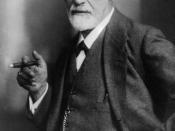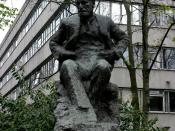The Contributions of Dr. Sigmund Freud
Sigmund Freud is the Jewish neurologist turned psychiatrist from 19th century Austria who is considered by many to be the father of the modern psychoanalytical method. The theories of Dr. Freud revolutionized the way society perceived mental workings and the mind. Among Freud's most famous theories are the theory of the mind, the Oedipus and Elektra complexes and the theory on the stages of sexual development.
Freud's theory of the mind is one of the most important aspects in studying the psyche. According to Freud the mind is divided into three sections: the id, the ego and the superego, each playing a different role. What Freud names the id is an unconscious region of the mind that initiates drives and instincts. This section is responsible for giving power to the three main needs, which according to Freud are satisfying hunger and thirst, the need to avoid pain, and the need for sexual gratification.
The demand to satisfy these three needs is known as the "pleasure principle."(Storr, p. 61) The id itself is incapable of organization, and as a result produces "no collective will, but only a striving to bring about satisfaction of instinctive needs." (Freud, p. 73) In other words the id cannot act on these instincts. To satisfy these instinctive needs, the id turns to another region of the mind: the ego. The ego is the conscious section of the mind that has the task of searching for objects and actions to satisfy the needs created by the id. The ego is the section of the mind associated with the senses, and as a result it is the only region connected to the outside world. As such, the ego acts as "an intermediary between the id and the external world." (Freud, p. 95)...



Good organization of points.
You have listed out Freud's ideas very clearly, and the terms used are very professional(psychology terms, aha :P). I like your part about Oedipus complex. and yet you failed to mention how superego develop. In the Oedipus complex part, you should further tell us that children identify themselves with their same-sex parent and internalize their parent's set of values, so as to pocess the opposite-sex parent vicariously. superego develops at this time. and this explain why people can act rationally although id is irrational in nature.
1 out of 1 people found this comment useful.